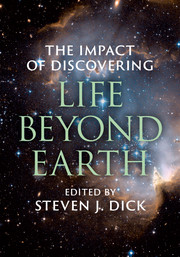Book contents
- Frontmatter
- Dedication
- Contents
- List of contributors
- Introduction: Astrobiology and society
- Part I Motivations and approaches: How do we frame the problems of discovery and impact?
- Part II Transcending anthropocentrism: How do we move beyond our own preconceptions of life, intelligence, and culture?
- Part III Philosophical, theological, and moral impact: How do we comprehend the cultural challenges raised by discovery?
- Part IV Practical considerations: how should society prepare for discovery – and non-discovery?
- Contributor biographies
- Index
- References
Introduction: Astrobiology and society
Published online by Cambridge University Press: 05 November 2015
- Frontmatter
- Dedication
- Contents
- List of contributors
- Introduction: Astrobiology and society
- Part I Motivations and approaches: How do we frame the problems of discovery and impact?
- Part II Transcending anthropocentrism: How do we move beyond our own preconceptions of life, intelligence, and culture?
- Part III Philosophical, theological, and moral impact: How do we comprehend the cultural challenges raised by discovery?
- Part IV Practical considerations: how should society prepare for discovery – and non-discovery?
- Contributor biographies
- Index
- References
Summary
The search for life in the universe, once the stuff of science fiction, is now a robust research program with a well-defined roadmap and mind-bending critical issues (Des Marais et al., 2008; Dick, 2012; Dick and Strick, 2004; Sullivan and Baross, 2007). The science of astrobiology – and there is no longer any doubt it is a science, simplistic slogans about “a science without a subject” notwithstanding – is funded by NASA and other institutions to the tune of tens of millions of dollars of ground-based research, not to mention the hundreds of millions spent on space-related missions. Biogeochemists study extremophile life on Earth, biologists study the origins of life, a bevy of spacecraft have orbited or landed on Mars, others have found potentially life-bearing oceans on Jovian and Saturnian moons as well as organic molecules on Titan, and the Kepler spacecraft has discovered thousands of planets beyond the solar system – all just a prelude to future studies. Recent US Congressional hearings on astrobiology indicate it is a hot topic in the policy arena (United States Congress, 2013 and 2014). And international interest is also strong, particularly within the European Space Agency. Although no life has yet been found beyond the Earth, the search for such life has arguably been a driver of the space program since its inception, has inspired multidisciplinary research on Earth, and is the subject of great popular interest that shows no signs of abating. As this volume illustrates, it is also a perennial theme in science fiction literature, igniting dreams of other worlds.
Given both scientific and popular interest in astrobiology it is important for scholars, practitioners, and policymakers to examine the societal implications of discovery in the event of success. Substantial studies have been undertaken on the societal impact of other scientific endeavors such as the Human Genome Project, biotechnology, nanotechnology, and spaceflight. Even closer to astrobiology's core interests are planetary protection protocols, which are certainly studies of potential impact since one of their goals is to prevent a catastrophic “Andromeda Strain” scenario, in the terminology of Michael Crichton's 1969 novel.
- Type
- Chapter
- Information
- The Impact of Discovering Life beyond Earth , pp. 1 - 6Publisher: Cambridge University PressPrint publication year: 2015

